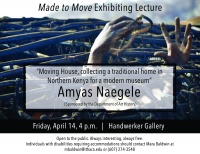 This gallery talk will be about how Amyas Naegele, who provided many of the objects for the current exhibition, Made to Move: African Nomadic Design, undertook the task of collecting a Rendille tent in Kenya in 2012 for presentation in a controlled museum environment. He will discuss the ways in which this journey sheds light on traditional and contemporary Africa as it relates to collecting and display, as well as the challenges of displaying architecture. Issues of temporality and the relationship of sedentary and nomadic communities will be a key part of the discussion, which will be moderated by Assistant Professor Risham Majeed, who curated the exhibition with her students.
This gallery talk will be about how Amyas Naegele, who provided many of the objects for the current exhibition, Made to Move: African Nomadic Design, undertook the task of collecting a Rendille tent in Kenya in 2012 for presentation in a controlled museum environment. He will discuss the ways in which this journey sheds light on traditional and contemporary Africa as it relates to collecting and display, as well as the challenges of displaying architecture. Issues of temporality and the relationship of sedentary and nomadic communities will be a key part of the discussion, which will be moderated by Assistant Professor Risham Majeed, who curated the exhibition with her students.
ABSTRACT:
In 2012 curators for Qatar Museums set out to design an exhibition that would highlight the role of women in the genesis of architecture: the nomadic tent. Part of their vision was to collect three such structures each from a different desert culture and to reassemble them in a gallery setting. There was one monumental obstacle: one of those cultures, the Rendille of northeastern Kenya, made a tent akin to a complex basket: taking it apart and putting it back together would require a level of experience and know how only a team of nomadic women could provide. This being impractical, it was agreed the Rendille tent would have to be collected whole, consolidated and shipped assembled. The gallery talk will be about how a one time resident of West Buffalo Street undertook that task and what that journey to Kenya's desert north can tell us about traditional and contemporary Africa as it relates to collecting and display. Issues of temporality and the relationship of sedentary and nomadic communities will be a key part of the discussion.
BIO:
The son and grandson of painters and graphic designers, Amyas grew up in New York City. He was first exposed to African and other arts art at a very early age through frequent trips to local museums and a close relationship with his next-door neighbors, the family of the preeminent pre-Columbian and antiquities dealer Edward H. Merrin. Amyas's familiarity with traditional objects grew during summers spent working at the American Museum of Natural History. Following his graduation from Cornell University in 1978, he traveled for two and a half years throughout Australia, New Guinea, Indonesia, Thailand, and the Indian subcontinent, which deepened his profound interest in traditional cultures. Amyas combines this love, as well as his firsthand knowledge of these cultures and the art and artifacts they produce, with a strong affinity for materials and a generations-deep aesthetic sense. He does not restrict art to figures and masks, nor to bowls, headrests, and hats. Art is the object, the craft behind it, and the sensitivity with which it is presented.
Individuals with disabilities requiring accommodations should contact Mara Baldwin at mbaldwin@ithaca.edu or (607) 274-3548. We ask that requests for accommodations be made as soon as possible.